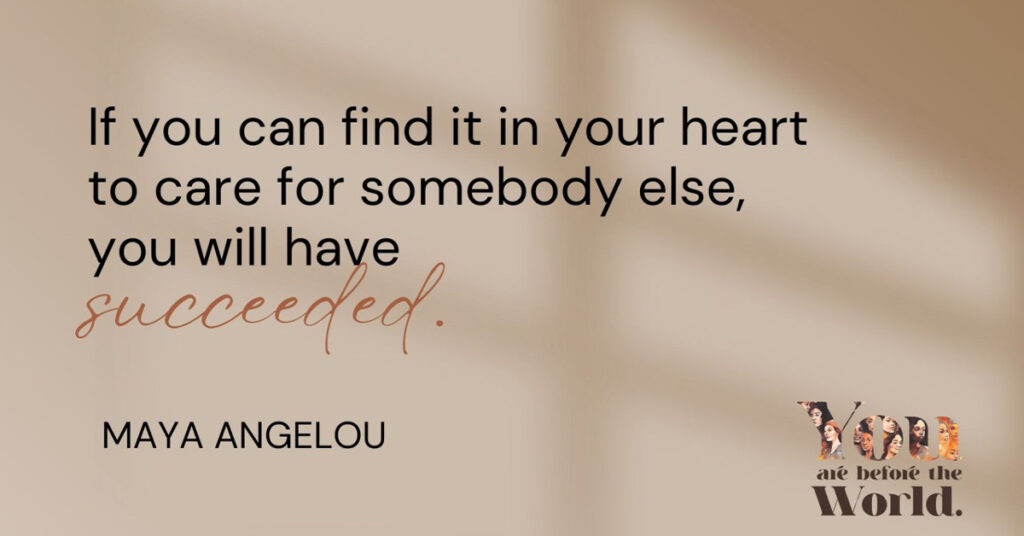The last time I spoke to Dr. Maya Angelou was a couple years before she died. I called to update her on the project we’d worked on, and before we hung up, she extended an invitation that hangs heavy on me to this day: “If you ever need my help, please reach out. For anything. Anything at all. You hear?”
“Yes, Ma’am. I understand,” I replied. “Thank you.”
I’ve not heard her voice since. Not because I didn’t need her, but because I was afraid I wasn’t important enough to call Dr. Maya Angelou—the woman whose work helped shape my own, whose kitchen table I’d dined at, who called Oprah Winfrey Daughter and Coretta Scott King Sister. I was afraid I didn’t have an irrefutably good reason to interrupt whatever extremely important thing she might be doing. Fear anchored me in place, and staying connected didn’t feel weighty enough to pull me forward. From my perspective, it was safer to know she cared for me without stress-testing just how much.
In late May of 2014, I felt moved to ask a former colleague if Dr. was okay. They hadn’t spoken in weeks, but she promised to check in. A few days later, Maya Angelou—universally beloved thinker, writer, performer—was gone. When she died, those who knew her best lost a mentor. A teacher. A role model. A mother-auntie-sister-friend. But on May 28th, 2014, after learning of her passing while cramped in the last row of a Boeing 737, it struck me profoundly that the world lost so much more.
Millions of fans who now knew Why the Caged Bird Sings, who heard A Song Flung Up to Heaven, who were there On the Pulse of Morning lost a north star who—rooted in the fragile foundation of our shared humanity—consistently and fearlessly pointed us toward our higher selves. She wasn’t blindly optimistic by any means. She lived through Jim Crow and the Civil Rights movement. She was friend to Malcolm and Martin and Baldwin and Hughes. She was a warrior for justice and an unapologetic believer that Spirit is with us, for us, and in us. She wielded hope like a shield, and love—a sword. There were none before her—self-made women who bridged pain and promise so effortlessly. There have been few since.
The news made me feel less sure of myself. Hers was the wisdom that watered many seeds of greatness in me.
There was the time I stood to offer the chair opposite her to a man I clearly thought deserved it more. She lowered me with her gaze. “Sit,” she instructed. “You’re just as worthy of that seat as anyone.” Claim your space.
And the day in Santa Monica when she stopped mid-stride to correct a young woman who ran toward her screaming, “Maya!” from across the street. Respect. Composure. Safety.
There was also the brisk but sunny afternoon we sat around her dining table in Winston Salem, marveling at the many works of art displayed throughout her home. “If it’s not beautiful or useful,” she advised, “get rid of it.” Inspiration balanced with function.
And most meaningfully, she taught me to value my own expertise each time she graciously received editorial guidance from me, which is how our relationship began. There is no greater compliment than to have your talent—your creative judgment—recognized by someone you’ve admired since childhood and whose work is the standard bearer in your field. You are worthy.
In the decade we worked together, there were countless memorable moments—professional and personal. Dr. Angelou sent flowers for the births of my children and made me a scratch vanilla cake when I turned thirty. In her presence, time passed slowly. We didn’t just share meals; we shared bites of storied dishes lovingly prepared. We didn’t just listen to her memories; we experienced the humor and love and courage in each step of many small journeys that, together, made a beautiful, vibrant, history-altering life. How fortunate to have known a living legend. How formidable this magnificent void.
Over and again, I’ve wondered what might be different about society if she were still here. What would she write about now? What would she say about the banning of her books—each its own masterpiece and, together, a master class? I wonder what she and Ms. Winfrey would discuss in television interviews or podcasts. How she would reframe both our human challenge and our leadership opportunity in this precarious moment when walls are erected daily, chasms are rapidly expanding, despair is taking root, and our way forward as a human race feels less like an open road and more like one massive stumbling block.
Dr. Angelou became an ancestor more than ten years ago, and while it intimidates me to write this in a way I can’t erase, I’ve often felt called to build upon her legacy—to use curiosity and love and language to illuminate our dark corners, and to lighten the psychological loads of those who have been denied the joy that is their birthright.
I believe we each have an inheritance. We have God-granted gifts—ways our minds and hands and mouths and bodies work—that are unique to us. We’ve had exposures and experiences that have shaped us. Beliefs that anchor us. A purpose that fuels us. Community—people who were sent to love and support and guide and watch over us. Voids we were designed to fill, but not lose ourselves in.
With each passing day, I more firmly feel that we are the answer we’ve been waiting for. Each of us and all of us—the invisible and forgotten and uncertain and seemingly hopeless who are just scared or lost or alone. We are our sanctuary. There is nothing we can’t achieve if we determine to love one another in it and through it.
Easy? No. Necessary? Absolutely. Love and light, especially in the darkness, are perhaps the greatest gifts we will ever have to give.
Tara Jaye Frank
